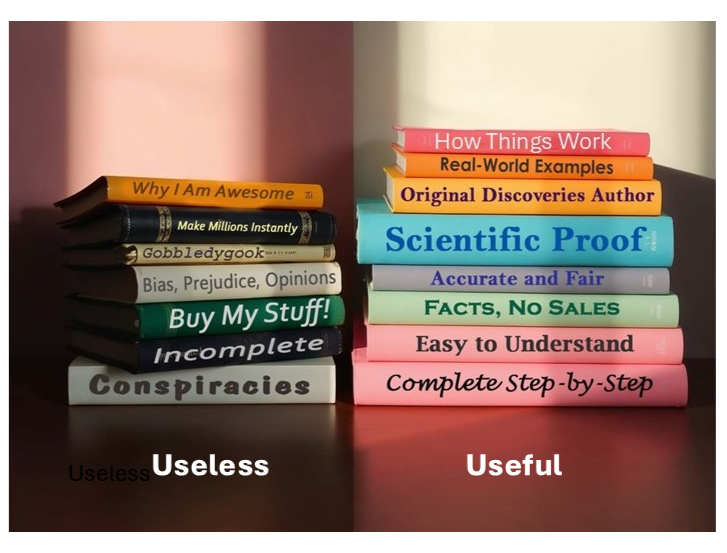How to Master Any Skill
Step 1: Pick the Right Material
You can learn your skill in several ways:
- Books or manuals
- Website articles
- YouTube videos
- Online courses
- AI chatbots
- Lectures at a college
- Supervised course rooms
- One-on-one coaching or tutoring
In all cases, you need to pick the TYPE of material you will study.
If the material is RIGHT, you can carefully study it and master the skill. It is fast and efficient.
If the material you study is WRONG, you will not master the skill. You will waste money and valuable time. You might even give up!
Even if you have no choice over the material you must study, it’s good to know which material will help you the most.
Ten Types of Wrong Material
1. Sales Pitch Material
For example, you buy a book on self-confidence. It’s a skill you have always wanted. You read it expecting it will help you, but the book pushes you to take an expensive course. You realize you did not get what you expected and your confidence has not increased.
2. Old Material
For example, you buy an online course to learn how to use Photoshop to edit pictures. You try to follow the instructions but your Photoshop program screen does not match the course instructor’s screen. You do a little research to discover the online course is six years old and uses an old version of Photoshop.
3. Writer Self-Importance
For example, you read a book on personal power. The author promotes how amazing he or she is instead of giving you solid, helpful information. “When I was flying in my helicopter to speak at an event I noticed thousands of people lining up to see me. Something like that really boosts your self-confidence!”
4. Unrealistic Claims
For example, “Just sign up here for $1000 per month and you will make millions this year . . . in your spare time!”
5. Incomplete Material
For example, the book says “Part One,” but you do not have “Part Two.”
Or you watch a lecture about future pandemics as the last one nearly destroyed your business. The speaker lists several potential diseases we might need to face. At the end of the lecture, the speaker says, “So everyone needs to think about this and find some solutions. Thank you.”
6. Slanted Material
The material is biased, prejudiced or slants toward a political party, conspiracy theory, religion, etc.
“If you vote for ____, you will be receive blessings.” “Everyone knows that men are better workers than women.” “Our children will all die unless we recycle.”
7. Material Based on Opinions
Instead of reading the original information, you read someone’s opinions about the original material.
For example, read the U.S. Constitution instead of someone’s book about it. Read what scientists, religious leaders or government officials actually say or write, not what the news media wants you to know.
8. Useless Material
For example, you want the skills to be a French chef. You subscribe to a weekly email of lessons, but they are mostly personal thoughts and stories about the writer’s life. The lessons are hidden near the end of the email forcing you to read the stories.
9. Disorganized Material
For example, you start an online course on how to give speeches. The course starts with writing an outline of talks, then jumps to promoting your speeches, then jumps to using jokes, then how to end a talk and then dealing with stage fright.
10. Bad Writing
For example, you want to master an online advertising skill. You find a website on advertising and start reading the articles. However, some of the words are misspelled, some of the sentences are incomplete and some do not make sense. At first you think the writer is an idiot, but then you realize the material was originally written in German and the translation is poor.
Other signs of bad writing include big words that most people do not understand, bad jokes and personal information about the writer.
Eight Tips for Picking the Right Material
 The right material is helpful and complete. The people behind the material must want to help you master the skill. These tips will help you find the material that is best for you.
The right material is helpful and complete. The people behind the material must want to help you master the skill. These tips will help you find the material that is best for you.
1. Try before buying.
Read sample pages of books or try an introductory course to ensure the material is going to be useful to you.
2. Read reviews of other readers and students.
Remember that a small percentage of reviews are fake, especially extremely critical reviews.
3. Check age of the material or date it was written or created.
Some material is timeless, such as managing organizations. Other material needs to be current and fresh, such as computer skills.
4. Avoid influencers.
Just because the someone is famous does not mean he or she knows how to teach anything to anyone. For example, motivational speakers, athletes, CEOs and celebrities are usually interesting, but not educators.
5. Look for proof.
For example, a course on website designs should have dozens of awesome websites he or she created. The instructor should also have dozens of happy students proving he or she is a good instructor.
6. Look for recommendations of the skill masters.
For example, if Warren Buffet (the greatest investor of all time) recommends a few investment books, you will know they are good books. If a movie star recommends an acting school, you can assume it’s a good school. If a certain technology expert wrote a book on how to use that technology, you can be confident the material will be right.
7. Who are the true masters of the skill you wish to master?
Who is the source of the biggest discoveries? Who is really good at using the skill? Read what THEY wrote.
For example, if you want to start a new software company, read what Bill Gates wrote about starting Microsoft. If you want the skill to invent new devices, read how Steve Jobs invented the iPhone. To master painting skills, read what Leonardo da Vinci said and wrote about painting.
8. Believe in your own opinions.
After you understand the material you may believe the material is wrong. If so, keep looking until you find material that is correct for you.
Next Step: #2 “Understand Every Word.”
Return to “How to Master Any Skill.”
Feedback Form
